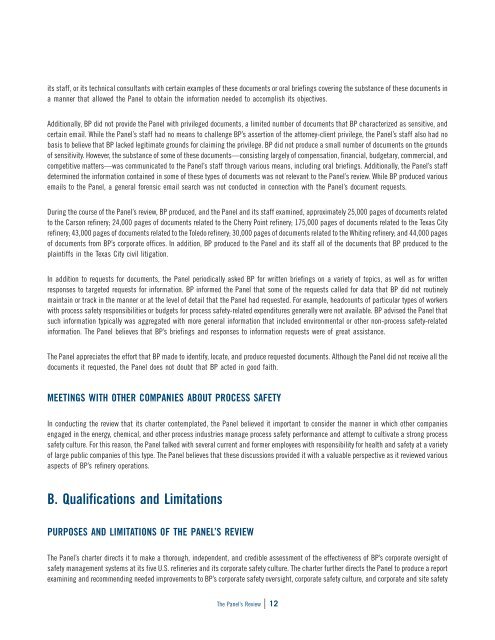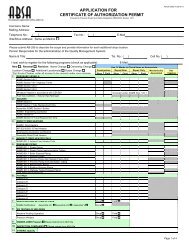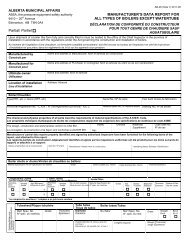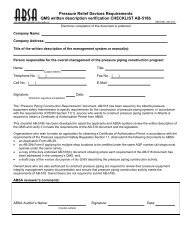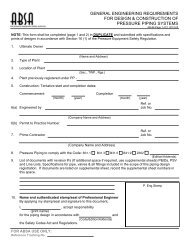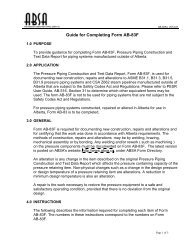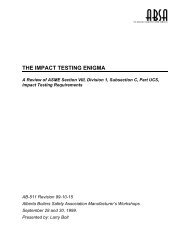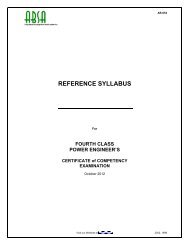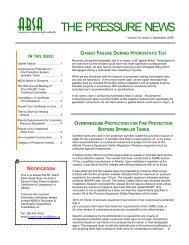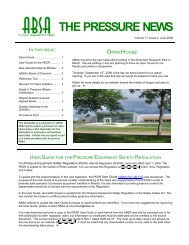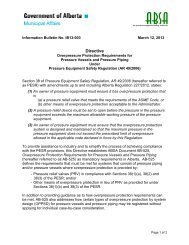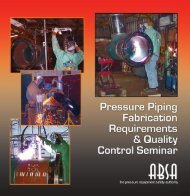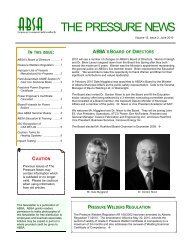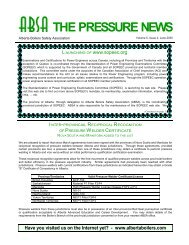The Baker Panel Report - ABSA
The Baker Panel Report - ABSA
The Baker Panel Report - ABSA
Create successful ePaper yourself
Turn your PDF publications into a flip-book with our unique Google optimized e-Paper software.
its staff, or its technical consultants with certain examples of these documents or oral briefings covering the substance of these documents ina manner that allowed the <strong>Panel</strong> to obtain the information needed to accomplish its objectives.Additionally, BP did not provide the <strong>Panel</strong> with privileged documents, a limited number of documents that BP characterized as sensitive, andcertain email. While the <strong>Panel</strong>’s staff had no means to challenge BP’s assertion of the attorney-client privilege, the <strong>Panel</strong>’s staff also had nobasis to believe that BP lacked legitimate grounds for claiming the privilege. BP did not produce a small number of documents on the groundsof sensitivity. However, the substance of some of these documents—consisting largely of compensation, financial, budgetary, commercial, andcompetitive matters—was communicated to the <strong>Panel</strong>’s staff through various means, including oral briefings. Additionally, the <strong>Panel</strong>’s staffdetermined the information contained in some of these types of documents was not relevant to the <strong>Panel</strong>’s review. While BP produced variousemails to the <strong>Panel</strong>, a general forensic email search was not conducted in connection with the <strong>Panel</strong>’s document requests.During the course of the <strong>Panel</strong>’s review, BP produced, and the <strong>Panel</strong> and its staff examined, approximately 25,000 pages of documents relatedto the Carson refinery; 24,000 pages of documents related to the Cherry Point refinery; 175,000 pages of documents related to the Texas Cityrefinery; 43,000 pages of documents related to the Toledo refinery; 30,000 pages of documents related to the Whiting refinery; and 44,000 pagesof documents from BP’s corporate offices. In addition, BP produced to the <strong>Panel</strong> and its staff all of the documents that BP produced to theplaintiffs in the Texas City civil litigation.In addition to requests for documents, the <strong>Panel</strong> periodically asked BP for written briefings on a variety of topics, as well as for writtenresponses to targeted requests for information. BP informed the <strong>Panel</strong> that some of the requests called for data that BP did not routinelymaintain or track in the manner or at the level of detail that the <strong>Panel</strong> had requested. For example, headcounts of particular types of workerswith process safety responsibilities or budgets for process safety-related expenditures generally were not available. BP advised the <strong>Panel</strong> thatsuch information typically was aggregated with more general information that included environmental or other non-process safety-relatedinformation. <strong>The</strong> <strong>Panel</strong> believes that BP’s briefings and responses to information requests were of great assistance.<strong>The</strong> <strong>Panel</strong> appreciates the effort that BP made to identify, locate, and produce requested documents. Although the <strong>Panel</strong> did not receive all thedocuments it requested, the <strong>Panel</strong> does not doubt that BP acted in good faith.MEETINGS WITH OTHER COMPANIES ABOUT PROCESS SAFETYIn conducting the review that its charter contemplated, the <strong>Panel</strong> believed it important to consider the manner in which other companiesengaged in the energy, chemical, and other process industries manage process safety performance and attempt to cultivate a strong processsafety culture. For this reason, the <strong>Panel</strong> talked with several current and former employees with responsibility for health and safety at a varietyof large public companies of this type. <strong>The</strong> <strong>Panel</strong> believes that these discussions provided it with a valuable perspective as it reviewed variousaspects of BP’s refinery operations.B. Qualifications and LimitationsPURPOSES AND LIMITATIONS OF THE PANEL’S REVIEW<strong>The</strong> <strong>Panel</strong>’s charter directs it to make a thorough, independent, and credible assessment of the effectiveness of BP’s corporate oversight ofsafety management systems at its five U.S. refineries and its corporate safety culture. <strong>The</strong> charter further directs the <strong>Panel</strong> to produce a reportexamining and recommending needed improvements to BP’s corporate safety oversight, corporate safety culture, and corporate and site safety<strong>The</strong> <strong>Panel</strong>’s Review C 12


